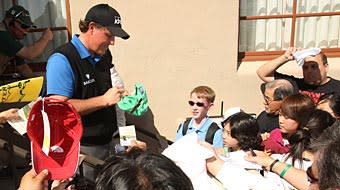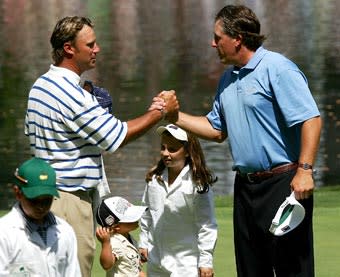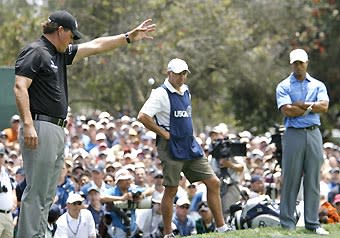Does anybody really know Phil Mickelson?

Phil Mickelson can often be seen signing autographs.
(Stephen Dunn/Getty Images)
As surely as the azaleas bloom, the adoring shouts will greet him on the first tee during this week’s Masters.
“Phil!” “Phil!’’ “Phil!”
Phil Mickelson will respond with his signature aw-shucks grin that he wears as faithfully as those golf shirts with the Callaway logo on his sleeve. Nowhere does he bask in the adulation like he has at Augusta National. He won his first major on the venerable course in 2004 and two years later claimed a second green jacket. The torrid love affair between him and golf fans sizzled, which is why that list must have stung.
Not the world rankings, which perpetually list Mickelson near the top, but rather GQ magazine’s 2006 list of “The Ten Most Hated Athletes.’’ Mickelson checked in at No. 8.
How is that possible, you might wonder, for a golfer who's so clearly a fan-favorite? The magazine focused on Mickelson's standing among his fellow pros and, anonymously, quoted a reporter saying, "He annoys everybody."
Then, a year after the GQ list was published, there was the 2007 Sports Illustrated player survey, in which fellow pros voted Mickelson as their second least favorite playing partner – a distant second behind universally despised Rory Sabbatini, mind you, but tied for second nonetheless.
The massive galleries that will follow Mickelson only magnify golf’s great paradox: The same man who generates as much public affection as any on the PGA tour – yes, even Tiger Woods – seems less popular among his fellow pros.
Some see him as phony. Some see him as smug. Rob Mangini sees a deep misunderstanding.
"Nobody knows him,'' said Mangini, who played college golf with Mickelson at Arizona State. "Nobody.''
Nobody, Mangini suggests, but his good friends. The ones who burned Mickelson's polyester golf clothes soon after he arrived at Arizona State in 1989 because that was their solution to overhauling the wardrobe of a "golf geek.'' The ones who cite acts of kindness, such as Mickelson's decision to pay for Conrad Dobler's daughter to attend college after learning the former NFL star was struggling financially. The ones who trade barbs with Mickelson as comfortably as they trade pleasantries, with Mangini saying that he would likely greet his college buddy as follows:
"Just please stay fat, Phil. You have a hot wife, a great family, a G5, three majors and the privilege of doing whatever you want in life. Just stay fat. Because if you get skinny I'll really have a complex about what a failure I am in life.''
With that, Mangini burst out laughing, as if to reinforce that adoring fans have it exactly right – that Mickelson is a genuine, generous and jolly good fellow who deserves their praise, not derision – and that the GQ list and SI survey were way off base. He suggests any animosity from Mickelson's peers stems from those jealous over a man who has it all: the attractive wife, Amy, the three cute children, the Gulfstream Jet ready to take off at a moment's notice and upward of $100 million in prize money and income from endorsements.
But money can’t buy Mickelson love from everyone.
Vijay Singh, when asked during a 2005 interview on "HBO: Real Sports" why he, unlike Mickelson, rarely smiles, tartly replied, "Is that the real Phil?''
Answering the question might be more difficult than winning the green jacket.
Yahoo!'s request for an interview was denied, which was no surprise. During 2008, Mickelson granted only one sit-down interview, with a trusted writer, which resulted in a positive story in Golf World magazine. There was no mention of the GQ list, the SI survey or any negative sentiment from Mickelson’s fellow pros.
As Steve Pate, a longtime pro, put it: "Sorry, but nobody smiles that much without trying.''

Chris DiMarco is a staunch defender of Mickelson.
(Harry How/Getty Images)
Howard Twitty, a former tour player, sees it differently.
"Phil has a great knack for hitting a spectacular shot and to give a smile that people connect with,'' Twitty said. "In that respect, when he's on the golf course, I think he kind of opens up and lets people into his world. Most great players don't let people into their world on the golf course.
"A lot of us are so used to competing that we are strictly into competition. There's no question Phil is 100 percent into the competition. But a part of him also is into kind of the show and the spectacle.''
One thing is clear: The reporter quoted anonymously in the GQ article got it dead wrong when he said, "Phil Mickelson literally has no friends out there.'' Not only does he have friends, he has fierce loyalists.
Chris DiMarco, for one. During a recent interview, DiMarco launched into a strong defense of the world's No. 2 golfer.
"The difference between him and Tiger, Phil's very businesslike and Phil handles himself a little differently,'' DiMarco said. "He smiles and, I don't know how to say it in the right way, but Phil, he's just a great guy. He does a great job for the sport.''
So there we go again. Even when it comes to on-course comportment, this is how it breaks down: Phil vs. Tiger, Tiger vs. Phil.
Mickelson occasionally trades high-fives with fans. Woods rarely makes eye-contact, much less physical contact. Mickelson signs autographs until the Sharpies dry out. There’s no need for Woods to carry a Sharpie; he doesn’t sign autographs on the golf course.
Yet in the clubhouse, it's Woods, not Mickelson, who's more frequently seen mingling with his counterparts.
"Phil has intentionally isolated himself from most of the guys,'' former PGA champ Mark Brooks said. "Whether that's right or wrong, it works for him.
"His time is so valuable. He's chosen not to spend it doing the camaraderie thing. I'm not criticizing him. It's just a choice he's made and it's probably affected his locker room reputation more than anything else.
"And the jealousy thing. Guys are jealous. They can't help but be.''
“Phil has intentionally isolated himself from most of the guys. Whether that's right or wrong, it works for him.”
– Mark Brooks.
At times, guys can't help but be miffed, as well – especially when Mickelson chooses to speak his mind, which he seems to do often.
In 2003, for example, Mickelson said he was complimenting Woods when he said the following: "He has a faster swing speed than I do, but he has inferior equipment. Tiger is the only player who is good enough to overcome the equipment he's stuck with."
Pardon Woods for not thanking Mickelson for the "compliment" that included an indirect shot at Nike, the company that manufactured Woods' "inferior equipment'' and pays Woods tens of millions a year to endorse its products. Furthermore, at the time of the remark, Mickelson had yet to win a major. Woods had won eight.
Then there was what he said to John Cook after Cook won the 2001 Reno-Tahoe Open.
"He said, 'Congratulations on your win at Reno but they really should never have events like that opposite the World Golf Championship event,' " Cook relayed. The remark irked Cook, who was thrilled to have won at the age of 44. "I said, 'You know what? If anybody else had been at that tournament, I would have beat their ass, too.' I don't know if he ever thinks that someone's going to come back and disagree with him. I just never really felt he had much respect for any other player, except for maybe Tiger."
Mickelson had been a vocal critic of opposite-field events, the less prestigious tournaments held in the same week of the more lucrative events in which Mickelson and the other top players compete. In Mickelson's view, those events water down the PGA Tour's product.
"I want to put this in a nice way,'' golfer Steve Stricker said, pausing. "Phil's got opinions on a lot of things.''
One longtime tour observer compared Mickelson to a kid who sits in the front row of class, the better to be seen by the teacher and demonstrate he has answers to all of the questions.
But even those who brand Mickelson a know-it-all must confess he knows a lot. He's a voracious reader whose friends think might have a photographic memory. Mangini, for instance, recalls caddying for Mickelson during a tournament in Japan when Corey Pavin, the 1995 U.S. Open champion, was the other American headliner. During a pretournament cocktail party, with more than 1,000 guests on hand, Pavin took the stage first.
"Thank you very much for having me,'' Mangini recalled Pavin saying.
Then Mickelson took the stage.
"Phil gets up and belts out about a 90-second thank you in Japanese,'' Mangini said. " … The whole place let out a roar, a roar of a cheer. I just sat there and go, 'Dude, you got to be kidding me. When did you learn that?' Learned it that day, memorized it that day.' "

Tiger Woods, right, and his caddie, Steve Williams, look on as Phil Mickelson takes a drop on the 17th hole during the first round of the 2008 U.S. Open golf championship.
(Denis Poroy/AP Photo)
But there were no raucous cheers at a dinner that included Jack and Barbara Nicklaus during the 2007 Presidents Cup. With a captive audience of fellow players and the Golden Bear, Mickelson outlined his views on what to do about gas prices. It was another example that he has a lot more on his mind that just making birdies.
"He had a whole plan,'' said Woody Austin, paired with Mickelson at the Presidents Cup. "He named names, how to do it, what he would do, how it would go about it, the whole bit. And he sounds very convincing, so I don't know enough about it to know whether or not it was BS or whatever. But it was a whole spiel.''
Scott Verplank, who said he considers Mickelson a friend, says he knew nothing about Mickelson's gas plan.
"He doesn't tell me all those stories,'' Verplank said. "He just tells that to guys that'll listen, like Woody."
During a round of interviews at the Northern Trust Open earlier this season, several pros expressed trepidation about saying anything even remotely critical of Mickelson. It's a cloistered world, and few seemed willing to create any controversy. Noting that, fellow pro Paul Goydos pointed to the GQ list and Sports Illustrated survey and dismissed both because they relied on anonymous opinions and confidential votes.
"To be honest with you, we need people to voice opinions and to stand behind their opinions,'' Goydos said, in a simultaneous nod to Mickelson and rebuke of those who criticize him only if granted anonymity. "There's something to be said for people that are willing to say things and put their name out there.''
Enter Steve Williams, caddie for Tiger Woods.
In December, when asked for his opinion about Mickelson's golf ability, Williams replied, ""I wouldn't call Mickelson a great player 'cause I hate the prick." When a journalist called to confirm the remarks, Williams confirmed them and reiterated his disdain for Mickelson.
More than offend Mickelson, Williams' remarks tested him.
It would have been one thing to criticize Mickelson behind closed doors, where he could have unholstered his rapier wit and carved up the perpetrator. But if Mickelson lashed out publicly, fans would have seen a different side of the doting father and husband – a side they might not like.
A full day passed. No response.
Then Mickelson issued a statement through his representative.
"After seeing Steve Williams' comments all I could think of was how lucky I am to have a class act like Bones [his caddie, Jim Mackay] on my bag and representing me."
After he finished in the par-3 tournament on Wednesday afternoon, Mickelson, as usual, signed autographs. The fans, his fans, wanted to get as close to him as possible.
Other than a chosen few, that’s as close as anybody likely will get.
